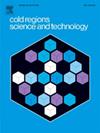Data-theory driven prediction approach for the residual axial load carrying capacity of RC columns under salt freeze-thaw cycles
IF 3.8
2区 工程技术
Q1 ENGINEERING, CIVIL
引用次数: 0
Abstract
This study aims to develop a data-theory driven approach to predict the residual axial load carrying capacity of reinforced concrete (RC) columns of bridges subjected to salt freeze-thaw cycles (SFTCs). The proposed approach integrates a data driven calculation model and a theory driven simulation model to simulate SFTCs, damage inheritance, and the residual axial load carrying capacity. The calculation model for the residual axial load carrying capacity of RC columns under SFTCs employs a Bi-directional Long-Short-Term Model (BiLSTM) as the primary structure, Convolutional Neural Networks (CNN) for data preprocessing, and Squeeze-and-Excitation Networks (SE) to enhance the data preprocessing capability of CNN, yielding reference values for the residual axial load carrying capacity. Additionally, the simulation model is constructed in ABAQUS to support the data-theory driven prediction of the residual axial load carrying capacity of RC columns under SFTCs. The results demonstrate that the data-theory driven approach accurately predicts the failure modes of RC columns under SFTCs and achieves a prediction accuracy exceeding 93 % for the residual axial load carrying capacity. Consequently, this approach offers an efficient solution for predicting the degradation of the residual axial load carrying capacity of RC columns under SFTCs, reducing experimental costs and enhancing efficiency.
盐冻融循环作用下钢筋混凝土柱残余轴向承载力的数据理论驱动预测方法
本研究旨在发展一种数据理论驱动的方法来预测受盐冻融循环(SFTCs)影响的钢筋混凝土(RC)桥梁柱的剩余轴向承载能力。该方法将数据驱动的计算模型和理论驱动的仿真模型相结合,对SFTCs、损伤继承和剩余轴向承载能力进行仿真。采用双向长短期模型(BiLSTM)为主要结构,卷积神经网络(CNN)进行数据预处理,挤压激励网络(SE)增强CNN的数据预处理能力,为SFTCs下RC柱的剩余轴向承载能力计算提供参考价值。此外,在ABAQUS软件中建立了模拟模型,以支持基于数据理论的SFTCs作用下RC柱剩余轴向承载力预测。结果表明,数据理论驱动方法能准确预测钢筋混凝土柱在SFTCs作用下的破坏模式,对残余轴向承载能力的预测精度达到93%以上。因此,该方法为预测钢筋混凝土柱在SFTCs作用下的剩余轴向承载力退化提供了有效的解决方案,降低了实验成本,提高了效率。
本文章由计算机程序翻译,如有差异,请以英文原文为准。
求助全文
约1分钟内获得全文
求助全文
来源期刊

Cold Regions Science and Technology
工程技术-地球科学综合
CiteScore
7.40
自引率
12.20%
发文量
209
审稿时长
4.9 months
期刊介绍:
Cold Regions Science and Technology is an international journal dealing with the science and technical problems of cold environments in both the polar regions and more temperate locations. It includes fundamental aspects of cryospheric sciences which have applications for cold regions problems as well as engineering topics which relate to the cryosphere.
Emphasis is given to applied science with broad coverage of the physical and mechanical aspects of ice (including glaciers and sea ice), snow and snow avalanches, ice-water systems, ice-bonded soils and permafrost.
Relevant aspects of Earth science, materials science, offshore and river ice engineering are also of primary interest. These include icing of ships and structures as well as trafficability in cold environments. Technological advances for cold regions in research, development, and engineering practice are relevant to the journal. Theoretical papers must include a detailed discussion of the potential application of the theory to address cold regions problems. The journal serves a wide range of specialists, providing a medium for interdisciplinary communication and a convenient source of reference.
 求助内容:
求助内容: 应助结果提醒方式:
应助结果提醒方式:


